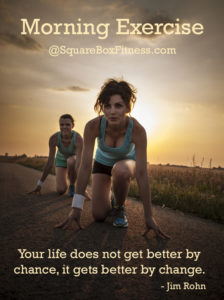 Many of us think about the healthy changes we would like to make in our lives, like eating better and exercising more.
Many of us think about the healthy changes we would like to make in our lives, like eating better and exercising more.
Making healthy changes is easier said than done. Even when we are strongly motivated, adopting a new, healthy habit can be tough.
The greatest obstacle to change is; the fear of change. It is the fear of change that can keep us in a physically destructive lifestyle.
Is “the devil you know” approach to exercise good enough?
The truth is; our body is changing, our habits are changing and our attitude is changing.
With the progress through our life we experience so much change. We may start to “freak out” because we feel unprepared for what these changes mean to the direction of our life, our relationships, and our identity.
Take a moment to reflect on your health and fitness over the last five years and ask: “Is my fitness a result of chance or change?” Then ask: “What will my fitness be in five years time?”
Irrespective of what has happened to us over the last five years, our body has continued, as it should, to change and meet the physical demands of our life.
When we look forward five years what frightens us?
Fear of the unknown is a natural defence and often cited as a reason for continuing our current lifestyle. The uncomfortable reality is, without exercise, in five years, our body will be unable to function as it does today.
Therefore, a fear of exercise may be driven partly from the unknown, but mainly and often, on an unconscious level by a sedentary life that has in the past offered pleasurable rewards without dire consequences.
The longer we live our life without exercise and healthy eating, will deepen the feelings that change towards exercise and better food is a “bad” thing. We will instinctively fight against the change for exercise, even though consciously we know it is good for our health.
In a 2010 study published in the Journal of Experimental Social Psychology, researchers showed people believe “longer is better.”
Five scenarios were explored and in all cases, the longer established alternative was selected as being preferable over the “new” even though there was no actual change to the object of the study.
Of the five studies, my favourite was of European chocolate, two identical blocks; one was described to the participants as having first been sold in its region 73 years ago and the other only three years ago. Participants preferred the “older” established chocolate……
The main point of the studies was that we as humans, unconsciously rate longevity as equal to goodness even when it shouldn’t matter, like the taste of chocolate.
An unconscious bias
If you have been previously unsuccessful in establishing an exercise program in your life and have never explored early morning exercise, perhaps now is the time to consider whether you are under the influence of an unconscious bias.
Unconscious bias is not impossible to overcome, but if you want to succeed in making exercise part of your life you may need to start realising that it may be there.
There is no research on the best time for exercise; however morning exercise does have a better success rate because it will not be squeezed out by the pressure of a busy day.
“Research suggests in terms of forming a consistent exercise habit, individuals who exercise in the morning tend to do better,” says Cedric Bryant, Ph.D., chief science officer with the American Council on Exercise in San Diego.
Are you a night owl?
If you believe that your body clock or circadian rhythm may preclude you from morning exercise, you may like to consider research by Dr. Richard Coleman, a chronobiologist who’s study was centred on developing night shift work schedules.
He explains that only about 20 percent of the population are extreme night owls or early birds, and 80% of us fall somewhere in the middle.
Carolyn Schur, author of “Birds of a different feather,” provides an explanation for the perceived higher percentages of modern night owls. She refers to “functional” night owls as a product of social, cultural or lifestyle factors that obligate a following of a schedule that is not of bio-rhythmic choosing.
I am a night owl, and early morning exercising is sincerely challenging. This research means to me that fitness success is not as simple as embracing something unknown, it is about giving up something old and enjoyed (good), for something new and initially uncomfortable (bad).
Personally, I don’t think it is ever possible to become an early bird if you are born a night owl, and thankfully exercise does not depend on personality type or physiological preferences.
Square Box Fitness is a morning only exercise program, because we enjoy living, treasure our time with family and friends, and value our physical health and therefore prioritise exercise for fitness success.
Live well and eat well
Anna

Recent Comments